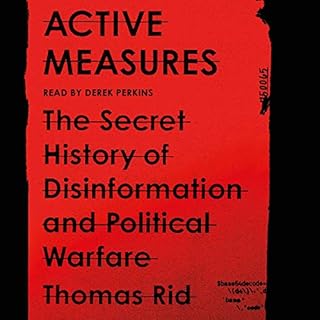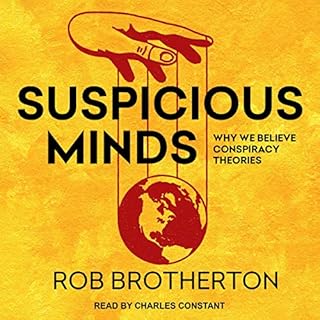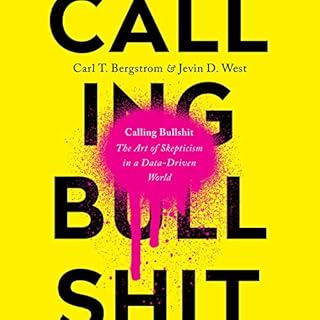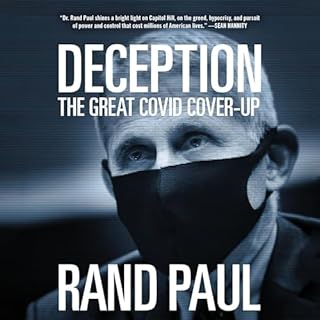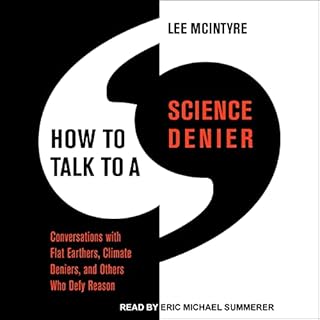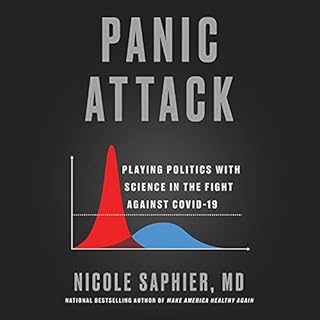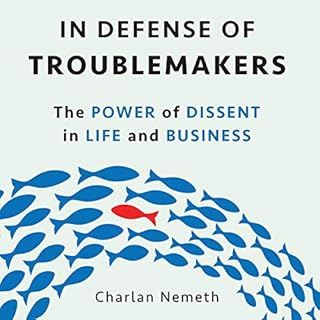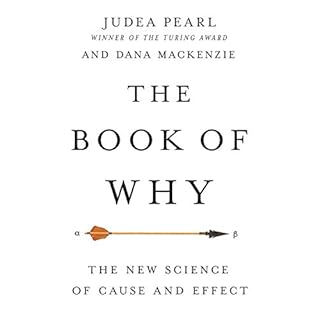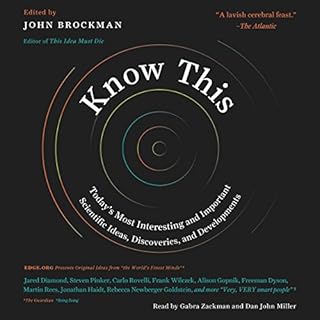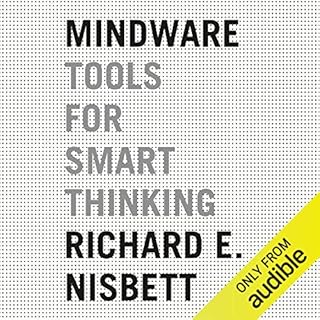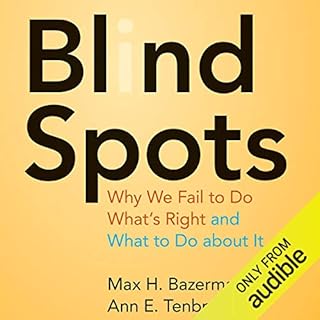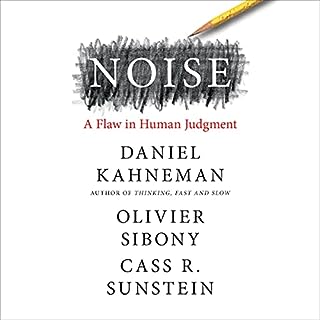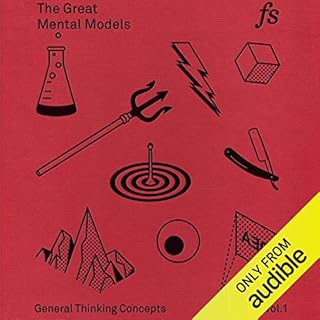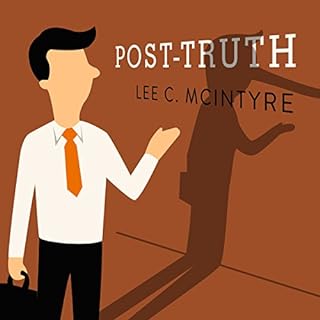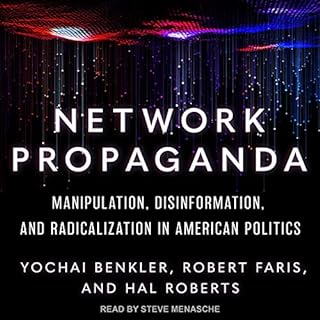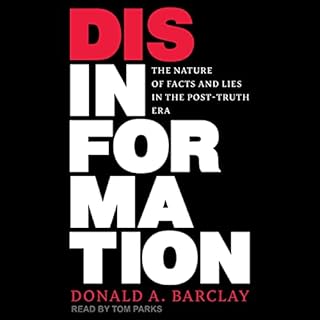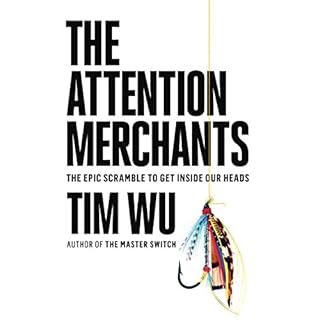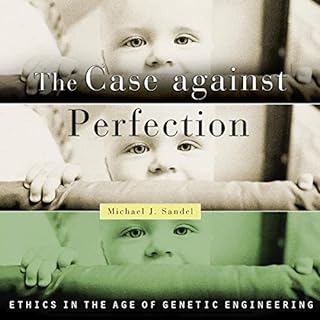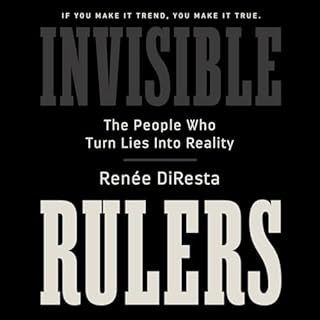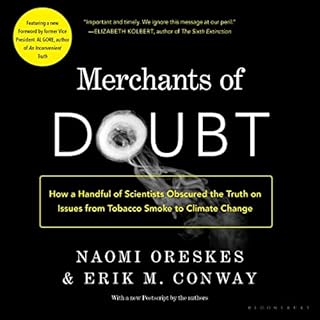
The Misinformation Age
How False Beliefs Spread
No se pudo agregar al carrito
Add to Cart failed.
Error al Agregar a Lista de Deseos.
Error al eliminar de la lista de deseos.
Error al añadir a tu biblioteca
Error al seguir el podcast
Error al dejar de seguir el podcast
 Exclusivo para miembros Prime: ¿Nuevo en Audible? Obtén 2 audiolibros gratis con tu prueba.
Exclusivo para miembros Prime: ¿Nuevo en Audible? Obtén 2 audiolibros gratis con tu prueba.Compra ahora por $17.19
No default payment method selected.
We are sorry. We are not allowed to sell this product with the selected payment method
-
Narrado por:
-
Chelsea Stephens
Acerca de esta escucha
The social dynamics of "alternative facts": why what you believe depends on who you know
Why should we care about having true beliefs? And why do demonstrably false beliefs persist and spread despite consequences for the people who hold them? Philosophers of science Cailin O'Connor and James Weatherall argue that social factors, rather than individual psychology, are what's essential to understanding the spread and persistence of false belief. It might seem that there's an obvious reason that true beliefs matter: false beliefs will hurt you. But if that's right, then why is it (apparently) irrelevant to many people whether they believe true things or not?
In an age riven by "fake news," "alternative facts," and disputes over the validity of everything from climate change to the size of inauguration crowds, the authors argue that social factors, not individual psychology, are what's essential to understanding the persistence of false belief and that we must know how those social forces work in order to fight misinformation effectively.
©2019 Cailin O’Connor and James Owen Weatherall (P)2019 TantorLos oyentes también disfrutaron...
-
Active Measures
- The Secret History of Disinformation and Political Warfare
- De: Thomas Rid
- Narrado por: Derek Perkins
- Duración: 14 h y 45 m
- Versión completa
-
General4.5 out of 5 stars 393
-
Narración:4.5 out of 5 stars 315
-
Historia4.5 out of 5 stars 314
We live in the age of disinformation - of organized deception. Spy agencies pour vast resources into hacking, leaking, and forging data, often with the goal of weakening the very foundation of liberal democracy: trust in facts. Thomas Rid, a renowned expert on technology and national security, was one of the first to sound the alarm, even before the 2016 election. But this is not new. The story of modern disinformation begins with the clash between communism and capitalism after the Russian Revolution.
-
5 out of 5 stars
-
Grounding book for COVID 19 Media
- De fjness en 05-12-20
De: Thomas Rid
-
The Revenge of Power
- How Autocrats Are Reinventing Politics for the 21st Century
- De: Moisés Naím
- Narrado por: Larry Herron
- Duración: 11 h y 11 m
- Versión completa
-
General4.5 out of 5 stars 53
-
Narración:4.5 out of 5 stars 43
-
Historia4.5 out of 5 stars 43
Moisés Naím turns to the trends, conditions, and behaviors that are contributing to the concentration of power, and to the clash between those forces that weaken power and those that strengthen it. He concentrates on the three “P”s - populism, polarization, and post-truths. All of which are as old as time, but are combined by today’s autocrats to undermine democratic life in new and frightening ways. Power has not changed. But the way people go about gaining it and using it has been transformed.
-
5 out of 5 stars
-
The narrator does not know the names of some politicians)))
- De Philippe Bogdanoff en 08-28-22
De: Moisés Naím
-
How Fascism Works
- The Politics of Us and Them
- De: Jason Stanley
- Narrado por: MacLeod Andrews
- Duración: 5 h y 44 m
- Versión completa
-
General4.5 out of 5 stars 1,548
-
Narración:4.5 out of 5 stars 1,319
-
Historia4.5 out of 5 stars 1,300
As the child of refugees of World War II Europe and a renowned philosopher and scholar of propaganda, Jason Stanley has a deep understanding of how democratic societies can be vulnerable to fascism: Nations don’t have to be fascist to suffer from fascist politics. In fact, fascism’s roots have been present in the United States for more than a century.
-
5 out of 5 stars
-
A Warning Too Clear to Ignore
- De Chip Auger en 10-30-18
De: Jason Stanley
-
LikeWar
- The Weaponization of Social Media
- De: P. W. Singer, Emerson T. Brooking
- Narrado por: George Guidall
- Duración: 11 h y 21 m
- Versión completa
-
General4.5 out of 5 stars 959
-
Narración:4.5 out of 5 stars 836
-
Historia4.5 out of 5 stars 831
Two defense experts explore the collision of war, politics, and social media, where the most important battles are now only a click away. Through the weaponization of social media, the Internet is changing war and politics, just as war and politics are changing the Internet. Terrorists livestream their attacks, “Twitter wars” produce real world casualties, and viral misinformation alters not just the result of battles, but the very fate of nations. The result is that war, tech, and politics have blurred into a new kind of battlespace that plays out on our smartphones.
-
1 out of 5 stars
-
Good Information Ruined by Whining Political Bias
- De Scott en 12-28-18
De: P. W. Singer, y otros
-
A Lot of People Are Saying
- The New Conspiracism and the Assault on Democracy
- De: Nancy L. Rosenblum, Russell Muirhead
- Narrado por: Katherine Fenton
- Duración: 6 h y 49 m
- Versión completa
-
General4.5 out of 5 stars 106
-
Narración:4.5 out of 5 stars 94
-
Historia4.5 out of 5 stars 95
Conspiracy theories are as old as politics. But conspiracists today have introduced something new - conspiracy without theory. And the new conspiracism has moved from the fringes to the heart of government with the election of Donald Trump. In A Lot of People Are Saying, Russell Muirhead and Nancy Rosenblum reveal how the new conspiracism differs from classic conspiracy theory, why so few officials speak truth to conspiracy, and what needs to be done to resist it.
-
5 out of 5 stars
-
INSIGHTFUL
- De JaredENH en 04-30-19
De: Nancy L. Rosenblum, y otros
-
Suspicious Minds
- Why We Believe Conspiracy Theories
- De: Rob Brotherton
- Narrado por: Charles Constant
- Duración: 8 h y 42 m
- Versión completa
-
General4.5 out of 5 stars 65
-
Narración:5 out of 5 stars 57
-
Historia4.5 out of 5 stars 57
Everyone loves a good conspiracy. Yet conspiracy theories are not a recent invention. And they are not always a harmless curiosity. In Suspicious Minds, Rob Brotherton explores the history and consequences of conspiracism, and delves into the research that offers insights into why so many of us are drawn to implausible, unproven and unproveable conspiracy theories. They resonate with some of our brain's built-in quirks and foibles, and tap into some of our deepest desires, fears, and assumptions about the world.
-
5 out of 5 stars
-
Enlightening ....nonsense makes sense.
- De dennis katsefes en 12-27-20
De: Rob Brotherton
-
Active Measures
- The Secret History of Disinformation and Political Warfare
- De: Thomas Rid
- Narrado por: Derek Perkins
- Duración: 14 h y 45 m
- Versión completa
-
General4.5 out of 5 stars 393
-
Narración:4.5 out of 5 stars 315
-
Historia4.5 out of 5 stars 314
We live in the age of disinformation - of organized deception. Spy agencies pour vast resources into hacking, leaking, and forging data, often with the goal of weakening the very foundation of liberal democracy: trust in facts. Thomas Rid, a renowned expert on technology and national security, was one of the first to sound the alarm, even before the 2016 election. But this is not new. The story of modern disinformation begins with the clash between communism and capitalism after the Russian Revolution.
-
5 out of 5 stars
-
Grounding book for COVID 19 Media
- De fjness en 05-12-20
De: Thomas Rid
-
The Revenge of Power
- How Autocrats Are Reinventing Politics for the 21st Century
- De: Moisés Naím
- Narrado por: Larry Herron
- Duración: 11 h y 11 m
- Versión completa
-
General4.5 out of 5 stars 53
-
Narración:4.5 out of 5 stars 43
-
Historia4.5 out of 5 stars 43
Moisés Naím turns to the trends, conditions, and behaviors that are contributing to the concentration of power, and to the clash between those forces that weaken power and those that strengthen it. He concentrates on the three “P”s - populism, polarization, and post-truths. All of which are as old as time, but are combined by today’s autocrats to undermine democratic life in new and frightening ways. Power has not changed. But the way people go about gaining it and using it has been transformed.
-
5 out of 5 stars
-
The narrator does not know the names of some politicians)))
- De Philippe Bogdanoff en 08-28-22
De: Moisés Naím
-
How Fascism Works
- The Politics of Us and Them
- De: Jason Stanley
- Narrado por: MacLeod Andrews
- Duración: 5 h y 44 m
- Versión completa
-
General4.5 out of 5 stars 1,548
-
Narración:4.5 out of 5 stars 1,319
-
Historia4.5 out of 5 stars 1,300
As the child of refugees of World War II Europe and a renowned philosopher and scholar of propaganda, Jason Stanley has a deep understanding of how democratic societies can be vulnerable to fascism: Nations don’t have to be fascist to suffer from fascist politics. In fact, fascism’s roots have been present in the United States for more than a century.
-
5 out of 5 stars
-
A Warning Too Clear to Ignore
- De Chip Auger en 10-30-18
De: Jason Stanley
-
LikeWar
- The Weaponization of Social Media
- De: P. W. Singer, Emerson T. Brooking
- Narrado por: George Guidall
- Duración: 11 h y 21 m
- Versión completa
-
General4.5 out of 5 stars 959
-
Narración:4.5 out of 5 stars 836
-
Historia4.5 out of 5 stars 831
Two defense experts explore the collision of war, politics, and social media, where the most important battles are now only a click away. Through the weaponization of social media, the Internet is changing war and politics, just as war and politics are changing the Internet. Terrorists livestream their attacks, “Twitter wars” produce real world casualties, and viral misinformation alters not just the result of battles, but the very fate of nations. The result is that war, tech, and politics have blurred into a new kind of battlespace that plays out on our smartphones.
-
1 out of 5 stars
-
Good Information Ruined by Whining Political Bias
- De Scott en 12-28-18
De: P. W. Singer, y otros
-
A Lot of People Are Saying
- The New Conspiracism and the Assault on Democracy
- De: Nancy L. Rosenblum, Russell Muirhead
- Narrado por: Katherine Fenton
- Duración: 6 h y 49 m
- Versión completa
-
General4.5 out of 5 stars 106
-
Narración:4.5 out of 5 stars 94
-
Historia4.5 out of 5 stars 95
Conspiracy theories are as old as politics. But conspiracists today have introduced something new - conspiracy without theory. And the new conspiracism has moved from the fringes to the heart of government with the election of Donald Trump. In A Lot of People Are Saying, Russell Muirhead and Nancy Rosenblum reveal how the new conspiracism differs from classic conspiracy theory, why so few officials speak truth to conspiracy, and what needs to be done to resist it.
-
5 out of 5 stars
-
INSIGHTFUL
- De JaredENH en 04-30-19
De: Nancy L. Rosenblum, y otros
-
Suspicious Minds
- Why We Believe Conspiracy Theories
- De: Rob Brotherton
- Narrado por: Charles Constant
- Duración: 8 h y 42 m
- Versión completa
-
General4.5 out of 5 stars 65
-
Narración:5 out of 5 stars 57
-
Historia4.5 out of 5 stars 57
Everyone loves a good conspiracy. Yet conspiracy theories are not a recent invention. And they are not always a harmless curiosity. In Suspicious Minds, Rob Brotherton explores the history and consequences of conspiracism, and delves into the research that offers insights into why so many of us are drawn to implausible, unproven and unproveable conspiracy theories. They resonate with some of our brain's built-in quirks and foibles, and tap into some of our deepest desires, fears, and assumptions about the world.
-
5 out of 5 stars
-
Enlightening ....nonsense makes sense.
- De dennis katsefes en 12-27-20
De: Rob Brotherton
-
The Alignment Problem
- Machine Learning and Human Values
- De: Brian Christian
- Narrado por: Brian Christian
- Duración: 13 h y 33 m
- Versión completa
-
General4.5 out of 5 stars 864
-
Narración:4.5 out of 5 stars 705
-
Historia4.5 out of 5 stars 700
Today's "machine-learning" systems, trained by data, are so effective that we've invited them to see and hear for us - and to make decisions on our behalf. But alarm bells are ringing. Systems cull résumés until, years later, we discover that they have inherent gender biases. Algorithms decide bail and parole - and appear to assess black and white defendants differently. We can no longer assume that our mortgage application, or even our medical tests, will be seen by human eyes. And autonomous vehicles on our streets can injure or kill.
-
5 out of 5 stars
-
Required reading for any AI course
- De ehan ferguson en 11-16-20
De: Brian Christian
-
Information Wars
- How We Lost the Global Battle Against Disinformation and What We Can Do About It
- De: Richard Stengel
- Narrado por: Christopher Grove
- Duración: 11 h y 17 m
- Versión completa
-
General4.5 out of 5 stars 178
-
Narración:4.5 out of 5 stars 154
-
Historia4.5 out of 5 stars 154
During the final three years of the Obama administration, Richard Stengel, the former editor of Time magazine and an Under Secretary of State, was the single person in government tasked with unpacking, disproving, and combating both ISIS's messaging and Russian disinformation. Then, in 2016, as the presidential election unfolded, Stengel watched as Donald Trump used disinformation himself, weaponizing the grievances of Americans who felt overlooked. In fact, Stengel quickly came to see how all three players had used the same playbook: ISIS sought to make Islam great again....
-
1 out of 5 stars
-
Partisan and defeatist at best.
- De Tim en 01-25-20
De: Richard Stengel
-
The Flag and the Cross
- White Christian Nationalism and the Threat to American Democracy
- De: Samuel L. Perry, Philip S. Gorski, Jemar Tisby - foreword
- Narrado por: Keith Sellon-Wright
- Duración: 4 h y 43 m
- Versión completa
-
General4.5 out of 5 stars 181
-
Narración:4.5 out of 5 stars 159
-
Historia4.5 out of 5 stars 155
Most Americans were shocked by the violence they witnessed at the nation's Capital on January 6th, 2021. And many were bewildered by the images displayed by the insurrectionists: a wooden cross and wooden gallows; "Jesus saves" and "Don't Tread on Me;" Christian flags and Confederate Flags; even a prayer in Jesus's name after storming the Senate chamber. Where some saw a confusing jumble, Philip S. Gorski and Samuel L. Perry saw a familiar ideology: white Christian nationalism.
-
5 out of 5 stars
-
could use an accompanying pdf
- De A W en 08-08-22
De: Samuel L. Perry, y otros
-
Fighting Misinformation
- Digital Media Literacy
- De: Tara Susman-Peña, Mehri Druckman, Nina Oduro, y otros
- Narrado por: Tara Susman-Peña
- Duración: 3 h y 34 m
- Grabación Original
-
General4.5 out of 5 stars 138
-
Narración:4.5 out of 5 stars 123
-
Historia4.5 out of 5 stars 123
Because we are continuously taking in information from a variety of sources, we are under constant threat from those who would intentionally (or accidentally) misinform - from foreign operatives, advertisers, politicians, and general scammers to our own friends and family. To better prepare you, IREX (International Research & Exchanges Board) has teamed up with The Great Courses to provide a guide for navigating this tricky landscape with this eight-lecture course designed to arm you with the skills you need to be a savvy media consumer.
-
4 out of 5 stars
-
Good resource
- De P. K. Bellville en 03-27-20
De: Tara Susman-Peña, y otros
-
Calling Bullshit
- The Art of Skepticism in a Data-Driven World
- De: Carl T. Bergstrom, Jevin D. West
- Narrado por: Patrick Zeller
- Duración: 10 h y 17 m
- Versión completa
-
General4.5 out of 5 stars 325
-
Narración:4.5 out of 5 stars 270
-
Historia4.5 out of 5 stars 266
Misinformation, disinformation, and fake news abound, and it’s increasingly difficult to know what’s true. We are fairly well equipped to spot the sort of old-school bullshit that is based in fancy rhetoric and weasel words, but most of us don’t feel qualified to challenge the avalanche of new-school bullshit presented in the language of math, science, or statistics. In Calling Bullshit, Professors Carl Bergstrom and Jevin West give us a set of powerful tools to cut through the most intimidating data.
-
3 out of 5 stars
-
Where is the pdf?
- De Nikhil Khanna en 08-07-20
De: Carl T. Bergstrom, y otros
-
The Constitution of Knowledge
- A Defense of Truth
- De: Jonathan Rauch
- Narrado por: Traber Burns
- Duración: 12 h y 23 m
- Versión completa
-
General4.5 out of 5 stars 458
-
Narración:4.5 out of 5 stars 390
-
Historia4.5 out of 5 stars 385
In this pathbreaking book, Jonathan Rauch reaches back to the parallel 18th-century developments of liberal democracy and science to explain what he calls the “Constitution of Knowledge” - our social system for turning disagreement into truth. By explicating the Constitution of Knowledge and probing the war on reality, Rauch arms defenders of truth with a clearer understanding of what they must protect, why they must do - and how they can do it.
-
5 out of 5 stars
-
A really good book
- De Will Blakey en 06-25-21
De: Jonathan Rauch
-
The Fall
- The End of Fox News and the Murdoch Dynasty
- De: Michael Wolff
- Narrado por: Michael Wolff - introduction, Holter Graham
- Duración: 10 h y 32 m
- Versión completa
-
General4.5 out of 5 stars 95
-
Narración:4.5 out of 5 stars 79
-
Historia4.5 out of 5 stars 79
For almost three decades, Fox News has not only made political careers (see: President Donald J. Trump) but also fundamentally altered the political landscape of the United States. It is a truism: as Fox goes, so goes the nation—into further divisiveness and awash in fake news, a gleefully polarizing company. But just as Fox has pushed America apart, now it too is coming apart. As is the family dynasty behind it.
-
5 out of 5 stars
-
Terrific rundown of Fox
- De Iread en 10-05-23
De: Michael Wolff
-
Deception
- The Great COVID Cover-Up
- De: Rand Paul
- Narrado por: Joe Louis
- Duración: 13 h y 45 m
- Versión completa
-
General5 out of 5 stars 231
-
Narración:5 out of 5 stars 215
-
Historia5 out of 5 stars 215
COVID-19 was deadly, but the real killer was the coverup, led by America’s most durable medical bureaucrat—a man for whom the truth was too often expendable. Senator Paul makes a powerful case that funding dangerous bioengineering in a totalitarian country is madness.
-
5 out of 5 stars
-
Not so much a book for today...
- De Mermaid en 10-15-23
De: Rand Paul
-
Why We're Polarized
- De: Ezra Klein
- Narrado por: Ezra Klein
- Duración: 8 h y 32 m
- Versión completa
-
General4.5 out of 5 stars 2,509
-
Narración:4.5 out of 5 stars 2,116
-
Historia4.5 out of 5 stars 2,093
In Why We’re Polarized, Klein reveals the structural and psychological forces behind America’s descent into division and dysfunction. Neither a polemic nor a lament, this book offers a clear framework for understanding everything from Trump’s rise to the Democratic Party’s leftward shift to the politicization of everyday culture. America is polarized, first and foremost, by identity. Everyone engaged in American politics is engaged, at some level, in identity politics.
-
3 out of 5 stars
-
Good as an intro, skip if you’re a wonk
- De Tony en 01-29-20
De: Ezra Klein
-
Algorithms of Oppression
- How Search Engines Reinforce Racism
- De: Safiya Umoja Noble
- Narrado por: Shayna Small
- Duración: 6 h y 21 m
- Versión completa
-
General4.5 out of 5 stars 386
-
Narración:4.5 out of 5 stars 328
-
Historia4.5 out of 5 stars 326
Run a Google search for “black girls” - what will you find? “Big Booty” and other sexually explicit terms are likely to come up as top search terms. But, if you type in “white girls”, the results are radically different. The suggested porn sites and un-moderated discussions about “why black women are so sassy” or “why black women are so angry” presents a disturbing portrait of black womanhood in modern society. In Algorithms of Oppression, Safiya Umoja Noble challenges the idea that search engines like Google offer an equal playing field for all forms of ideas, identities, and activities.
-
5 out of 5 stars
-
Read this book. Tell everyone you know about it.
- De Joshua Daniel-Wariya en 06-06-19
-
The Destructionists
- The Twenty-Five Year Crack-Up of the Republican Party
- De: Dana Milbank
- Narrado por: Dana Milbank
- Duración: 11 h y 58 m
- Versión completa
-
General5 out of 5 stars 401
-
Narración:5 out of 5 stars 366
-
Historia5 out of 5 stars 364
In 1994, more than 300 Republicans under the command of obstructionist and rabble-rouser Congressman Newt Gingrich stood outside the U.S. Capitol to sign the Contract with America and put bipartisanship on notice. Twenty-five years later, on January 6, 2021, a bloodthirsty mob incited by President Trump invaded the Capitol.
-
5 out of 5 stars
-
Learned things
- De Sue en 08-23-22
De: Dana Milbank
-
How to Talk to a Science Denier
- Conversations with Flat Earthers, Climate Deniers, and Others Who Defy Reason
- De: Lee McIntyre
- Narrado por: Eric Michael Summerer
- Duración: 8 h y 32 m
- Versión completa
-
General4.5 out of 5 stars 109
-
Narración:4.5 out of 5 stars 89
-
Historia4.5 out of 5 stars 89
"Climate change is a hoax - and so is coronavirus." "Vaccines are bad for you." These days, many of our fellow citizens reject scientific expertise and prefer ideology to facts. They are not merely uninformed - they are misinformed. They cite cherry-picked evidence, rely on fake experts, and believe conspiracy theories. How can we get them to change their minds and accept the facts when they don't believe in facts? In this book, Lee McIntyre shows that anyone can fight back against science deniers, and argues that it's important to do so. Science denial can kill.
-
5 out of 5 stars
-
Well worth a listen, good info and some flaws
- De Sara S en 10-08-21
De: Lee McIntyre
Relacionado con este tema
-
Why Trust Science?
- The University Center for Human Values, Book 1
- De: Naomi Oreskes
- Narrado por: John Chancer, Kelly Burke, Kerry Shale, y otros
- Duración: 8 h y 27 m
- Versión completa
-
General4.5 out of 5 stars 82
-
Narración:4.5 out of 5 stars 71
-
Historia4.5 out of 5 stars 71
Do doctors really know what they are talking about when they tell us vaccines are safe? Should we take climate experts at their word when they warn us about the perils of global warming? Why should we trust science when our own politicians don't? In this landmark book, Naomi Oreskes offers a bold and compelling defense of science, revealing why the social character of scientific knowledge is its greatest strength - and the greatest reason we can trust it.
-
5 out of 5 stars
-
Perfect Production of an Excellent Work
- De Andrew Mazibrada en 01-15-20
De: Naomi Oreskes
-
The Hockey Stick and the Climate Wars
- De: Michael Mann
- Narrado por: Luke Daniels
- Duración: 11 h y 54 m
- Versión completa
-
General4.5 out of 5 stars 56
-
Narración:4.5 out of 5 stars 51
-
Historia4.5 out of 5 stars 50
In its 2001 report on global climate, the Intergovernmental Panel on Climate Change of the United Nations prominently featured the "Hockey Stick", a chart showing global temperature data over the past 1,000 years. The Hockey Stick demonstrated that temperature had risen with the increase in industrialization and use of fossil fuels. The inescapable conclusion was that worldwide human activity since the industrial age had raised CO2 levels, trapping greenhouse gases in the atmosphere and warming the planet.
-
5 out of 5 stars
-
Speaking truth to power
- De Anonymous User en 06-06-24
De: Michael Mann
-
Too Big To Know
- Rethinking Knowledge Now That the Facts Aren't the Facts, Experts Are Everywhere, and the Smartest Person in the Room Is the Room
- De: David Weinberger
- Narrado por: Peter Johnson
- Duración: 8 h y 2 m
- Versión completa
-
General3.5 out of 5 stars 139
-
Narración:4 out of 5 stars 110
-
Historia4 out of 5 stars 109
We used to know how to know. We got our answers from books or experts. We'd nail down the facts and move on. But in the Internet age, knowledge has moved onto networks. There's more knowledge than ever, of course, but it's different. Topics have no boundaries, and nobody agrees on anything.Yet this is the greatest time in history to be a knowledge seeker - if you know how.
-
4 out of 5 stars
-
Good to know ...
- De John B. Fisher en 01-24-12
De: David Weinberger
-
Presidential Takedown
- How Anthony Fauci, the CDC, NIH, and the WHO Conspired to Overthrow President Trump
- De: Dr. Paul Elias Alexander, Kent Heckenlively
- Narrado por: Bob Johnson
- Duración: 9 h y 40 m
- Versión completa
-
General5 out of 5 stars 37
-
Narración:4.5 out of 5 stars 34
-
Historia5 out of 5 stars 33
In January 2020, Donald Trump was on the fast track to an easy re-election. While his first two years had been stymied by House Speaker Paul Ryan, Senate Majority Leader Mitch McConnell, and the Democrats, his third year had been one of remarkable success. The United States had low unemployment and was making strides across the globe. The president's rallies were well-attended, and he was being projected to win four hundred electoral votes and about forty-five states. Then came COVID-19.
-
5 out of 5 stars
-
Must listen!!
- De Christina Borkowski en 01-10-23
De: Dr. Paul Elias Alexander, y otros
-
Panic Attack
- Playing Politics with Science in the Fight Against COVID-19
- De: Nicole Saphier
- Narrado por: Nicole Saphier
- Duración: 10 h y 1 m
- Versión completa
-
General4.5 out of 5 stars 65
-
Narración:4.5 out of 5 stars 56
-
Historia4.5 out of 5 stars 56
Medical doctor and national bestselling author of Make America Healthy Again Nicole Saphier reveals how politicization of the COVID-19 pandemic has baffled the public by creating distrust, fueling conspiracy theories, and making it harder for Americans to understand the necessary path forward. The pandemic has resulted in a failure of government, much of which is unavoidable in a unique disaster scenario. However, the rampant politicization of science has hopelessly muddied the water and knee-jerk anti-Trumpism made it all worse.
-
1 out of 5 stars
-
Very disappointed
- De K. Green en 07-29-21
De: Nicole Saphier
-
In Defense of Troublemakers
- The Power of Dissent in Life and Business
- De: Charlan Nemeth
- Narrado por: Joyce Bean
- Duración: 6 h y 2 m
- Versión completa
-
General4.5 out of 5 stars 41
-
Narración:4 out of 5 stars 33
-
Historia4.5 out of 5 stars 34
We've decided by consensus that consensus is good. In In Defense of Troublemakers, psychologist Charlan Nemeth argues that this principle is completely wrong: left unchallenged, the majority opinion is often biased, unoriginal, or false. It leads planes and markets to crash, causes juries to convict innocent people, and can quite literally make people think blue is green. In the name of comity, we embrace stupidity. We can make better decisions by embracing dissent. Dissent forces us to question the status quo, consider more information, and engage in creative decision-making.
-
5 out of 5 stars
-
A Good Review of Group Thinking
- De J. Justice en 03-20-24
De: Charlan Nemeth
-
Why Trust Science?
- The University Center for Human Values, Book 1
- De: Naomi Oreskes
- Narrado por: John Chancer, Kelly Burke, Kerry Shale, y otros
- Duración: 8 h y 27 m
- Versión completa
-
General4.5 out of 5 stars 82
-
Narración:4.5 out of 5 stars 71
-
Historia4.5 out of 5 stars 71
Do doctors really know what they are talking about when they tell us vaccines are safe? Should we take climate experts at their word when they warn us about the perils of global warming? Why should we trust science when our own politicians don't? In this landmark book, Naomi Oreskes offers a bold and compelling defense of science, revealing why the social character of scientific knowledge is its greatest strength - and the greatest reason we can trust it.
-
5 out of 5 stars
-
Perfect Production of an Excellent Work
- De Andrew Mazibrada en 01-15-20
De: Naomi Oreskes
-
The Hockey Stick and the Climate Wars
- De: Michael Mann
- Narrado por: Luke Daniels
- Duración: 11 h y 54 m
- Versión completa
-
General4.5 out of 5 stars 56
-
Narración:4.5 out of 5 stars 51
-
Historia4.5 out of 5 stars 50
In its 2001 report on global climate, the Intergovernmental Panel on Climate Change of the United Nations prominently featured the "Hockey Stick", a chart showing global temperature data over the past 1,000 years. The Hockey Stick demonstrated that temperature had risen with the increase in industrialization and use of fossil fuels. The inescapable conclusion was that worldwide human activity since the industrial age had raised CO2 levels, trapping greenhouse gases in the atmosphere and warming the planet.
-
5 out of 5 stars
-
Speaking truth to power
- De Anonymous User en 06-06-24
De: Michael Mann
-
Too Big To Know
- Rethinking Knowledge Now That the Facts Aren't the Facts, Experts Are Everywhere, and the Smartest Person in the Room Is the Room
- De: David Weinberger
- Narrado por: Peter Johnson
- Duración: 8 h y 2 m
- Versión completa
-
General3.5 out of 5 stars 139
-
Narración:4 out of 5 stars 110
-
Historia4 out of 5 stars 109
We used to know how to know. We got our answers from books or experts. We'd nail down the facts and move on. But in the Internet age, knowledge has moved onto networks. There's more knowledge than ever, of course, but it's different. Topics have no boundaries, and nobody agrees on anything.Yet this is the greatest time in history to be a knowledge seeker - if you know how.
-
4 out of 5 stars
-
Good to know ...
- De John B. Fisher en 01-24-12
De: David Weinberger
-
Presidential Takedown
- How Anthony Fauci, the CDC, NIH, and the WHO Conspired to Overthrow President Trump
- De: Dr. Paul Elias Alexander, Kent Heckenlively
- Narrado por: Bob Johnson
- Duración: 9 h y 40 m
- Versión completa
-
General5 out of 5 stars 37
-
Narración:4.5 out of 5 stars 34
-
Historia5 out of 5 stars 33
In January 2020, Donald Trump was on the fast track to an easy re-election. While his first two years had been stymied by House Speaker Paul Ryan, Senate Majority Leader Mitch McConnell, and the Democrats, his third year had been one of remarkable success. The United States had low unemployment and was making strides across the globe. The president's rallies were well-attended, and he was being projected to win four hundred electoral votes and about forty-five states. Then came COVID-19.
-
5 out of 5 stars
-
Must listen!!
- De Christina Borkowski en 01-10-23
De: Dr. Paul Elias Alexander, y otros
-
Panic Attack
- Playing Politics with Science in the Fight Against COVID-19
- De: Nicole Saphier
- Narrado por: Nicole Saphier
- Duración: 10 h y 1 m
- Versión completa
-
General4.5 out of 5 stars 65
-
Narración:4.5 out of 5 stars 56
-
Historia4.5 out of 5 stars 56
Medical doctor and national bestselling author of Make America Healthy Again Nicole Saphier reveals how politicization of the COVID-19 pandemic has baffled the public by creating distrust, fueling conspiracy theories, and making it harder for Americans to understand the necessary path forward. The pandemic has resulted in a failure of government, much of which is unavoidable in a unique disaster scenario. However, the rampant politicization of science has hopelessly muddied the water and knee-jerk anti-Trumpism made it all worse.
-
1 out of 5 stars
-
Very disappointed
- De K. Green en 07-29-21
De: Nicole Saphier
-
In Defense of Troublemakers
- The Power of Dissent in Life and Business
- De: Charlan Nemeth
- Narrado por: Joyce Bean
- Duración: 6 h y 2 m
- Versión completa
-
General4.5 out of 5 stars 41
-
Narración:4 out of 5 stars 33
-
Historia4.5 out of 5 stars 34
We've decided by consensus that consensus is good. In In Defense of Troublemakers, psychologist Charlan Nemeth argues that this principle is completely wrong: left unchallenged, the majority opinion is often biased, unoriginal, or false. It leads planes and markets to crash, causes juries to convict innocent people, and can quite literally make people think blue is green. In the name of comity, we embrace stupidity. We can make better decisions by embracing dissent. Dissent forces us to question the status quo, consider more information, and engage in creative decision-making.
-
5 out of 5 stars
-
A Good Review of Group Thinking
- De J. Justice en 03-20-24
De: Charlan Nemeth
-
The Book of Why
- The New Science of Cause and Effect
- De: Judea Pearl, Dana Mackenzie
- Narrado por: Mel Foster
- Duración: 15 h y 14 m
- Versión completa
-
General4.5 out of 5 stars 835
-
Narración:4.5 out of 5 stars 690
-
Historia4.5 out of 5 stars 688
"Correlation does not imply causation". This mantra has been invoked by scientists for decades and has led to a virtual prohibition on causal talk. But today, that taboo is dead. The causal revolution, sparked by Judea Pearl and his colleagues, has cut through a century of confusion and placed causality - the study of cause and effect - on a firm scientific basis.
-
5 out of 5 stars
-
Great book! Not a great audiobook.
- De rrwright en 05-30-18
De: Judea Pearl, y otros
-
The Science of Fear
- Why We Fear the Things We Should Not - and Put Ourselves in Great Danger
- De: Daniel Gardner
- Narrado por: Scott Peterson
- Duración: 12 h y 8 m
- Versión completa
-
General4 out of 5 stars 1,016
-
Narración:4 out of 5 stars 674
-
Historia4 out of 5 stars 678
From terror attacks to the War on Terror, bursting real-estate bubbles to crystal meth epidemics, sexual predators to poisonous toys from China, our list of fears seems to be exploding. And yet, we are the safest and healthiest humans in history. Irrational fear is running amok, and often with tragic results. In the months after 9/11, when people decided to drive instead of fly - believing they were avoiding risk - road deaths rose by 1,595. Those lives were lost to fear.
-
5 out of 5 stars
-
A rational assessment of the world we live in
- De K Head en 08-29-09
De: Daniel Gardner
-
To Save Everything, Click Here
- The Folly of Technological Solutionism
- De: Evgeny Morozov
- Narrado por: Stephen Hoye
- Duración: 15 h y 59 m
- Versión completa
-
General4 out of 5 stars 106
-
Narración:4 out of 5 stars 88
-
Historia4 out of 5 stars 87
In the very near future, smart “technologies and big data” will allow us to make large-scale and sophisticated interventions in politics, culture, and everyday life. Technology will allow us to solve problems in highly original ways and create new incentives to get more people to do the right thing. But how will such “solutionism” affect our society, once deeply political, moral, and irresolvable dilemmas are recast as uncontroversial and easily manageable matters of technological efficiency?
-
5 out of 5 stars
-
The about face shift in view I've been looking for
- De McKane en 03-18-15
De: Evgeny Morozov
-
Breaking the Spell
- Religion as a Natural Phenomenon
- De: Daniel C. Dennett
- Narrado por: Dennis Holland
- Duración: 12 h y 19 m
- Versión completa
-
General4.5 out of 5 stars 759
-
Narración:4.5 out of 5 stars 662
-
Historia4.5 out of 5 stars 649
For all the thousands of books that have been written about religion, few until this one have attempted to examine it scientifically: to ask why - and how - it has shaped so many lives so strongly. Is religion a product of blind evolutionary instinct or rational choice? Is it truly the best way to live a moral life? Ranging through biology, history, and psychology, Daniel C. Dennett charts religion’s evolution from “wild” folk belief to “domesticated” dogma.
-
5 out of 5 stars
-
Great Reader Actually Enhances A Great Book!
- De Don Caliente en 07-14-14
-
Know This
- Today's Most Interesting and Important Scientific Ideas, Discoveries, and Developments
- De: John Brockman
- Narrado por: Gabra Zackman, Dan John Miller
- Duración: 14 h y 39 m
- Versión completa
-
General4 out of 5 stars 232
-
Narración:4 out of 5 stars 204
-
Historia4 out of 5 stars 201
Scientific developments radically alter our understanding of the world. Whether it's technology, climate change, health research, or the latest revelations of neuroscience, physics, or psychology, science has, as Edge editor John Brockman says, "become a big story, if not the big story". In that spirit this new addition to Edge.org's fascinating series asks a powerful and provocative question: What do you consider the most interesting and important recent scientific news?
-
1 out of 5 stars
-
Pete and Repeat and Re-repeat
- De Daniel L en 02-25-18
De: John Brockman
-
Mindware
- Tools for Smart Thinking
- De: Richard E. Nisbett
- Narrado por: Joe Barrett
- Duración: 10 h y 17 m
- Versión completa
-
General4 out of 5 stars 510
-
Narración:4 out of 5 stars 434
-
Historia4 out of 5 stars 427
Many scientific and philosophical ideas are so powerful that they can be applied to our lives at home, work, and school to help us think smarter and more effectively about our behavior and the world around us. Surprisingly, many of these ideas remain unknown to most of us. In Mindware, the world-renowned psychologist Richard Nisbett presents these ideas in clear and accessible detail, offering a tool kit for better thinking and wiser decisions.
-
5 out of 5 stars
-
Sound scientific advice on how to live your life
- De Neuron en 08-26-15
-
Blind Spots
- Why We Fail to Do What’s Right and What to Do about It
- De: Max H. Bazerman, Ann E. Tenbrunsel
- Narrado por: Kate McQueen
- Duración: 7 h y 18 m
- Versión completa
-
General4 out of 5 stars 99
-
Narración:4 out of 5 stars 79
-
Historia4 out of 5 stars 80
When confronted with an ethical dilemma, most of us like to think we would stand up for our principles. But we are not as ethical as we think we are. In Blind Spots, leading business ethicists Max Bazerman and Ann Tenbrunsel examine the ways we overestimate our ability to do what is right and how we act unethically without meaning to.
-
5 out of 5 stars
-
Great book! Poor narration
- De Susie en 11-20-17
De: Max H. Bazerman, y otros
-
Noise
- A Flaw in Human Judgment
- De: Daniel Kahneman, Olivier Sibony, Cass R. Sunstein
- Narrado por: Jonathan Todd Ross
- Duración: 13 h y 28 m
- Versión completa
-
General4.5 out of 5 stars 1,420
-
Narración:4.5 out of 5 stars 1,156
-
Historia4.5 out of 5 stars 1,145
From the best-selling author of Thinking, Fast and Slow, the co-author of Nudge, and the author of You Are About to Make a Terrible Mistake! comes Noise, a revolutionary exploration of why people make bad judgments, and how to control both noise and cognitive bias.
-
1 out of 5 stars
-
Disappointing
- De Z28 en 05-31-21
De: Daniel Kahneman, y otros
-
Giving the Devil His Due
- Reflections of a Scientific Humanist
- De: Michael Shermer
- Narrado por: Michael Shermer
- Duración: 13 h y 25 m
- Versión completa
-
General4.5 out of 5 stars 156
-
Narración:4 out of 5 stars 129
-
Historia4.5 out of 5 stars 126
Who is the "Devil"? And what is he due? The devil is anyone who disagrees with you. And what he is due is the right to speak his mind. He must have this for your own safety's sake, because his freedom is inextricably tied to your own. If he can be censored, why shouldn't you be censored? If we put barriers up to silence "unpleasant" ideas, what's to stop the silencing of any discussion? This book is a full-throated defense of free speech and open inquiry in politics, science, and culture by the New York Times best-selling author and skeptic Michael Shermer.
-
3 out of 5 stars
-
Flawed Audio
- De Private en 04-10-20
De: Michael Shermer
-
The Great Mental Models
- General Thinking Concepts
- De: Shane Parrish
- Narrado por: Shane Parrish
- Duración: 3 h y 23 m
- Versión completa
-
General4.5 out of 5 stars 1,653
-
Narración:4 out of 5 stars 1,374
-
Historia4.5 out of 5 stars 1,355
The Great Mental Models: General Thinking Concepts is the first book in The Great Mental Models series designed to upgrade your thinking with the best, most useful and powerful tools so you always have the right one on hand. This volume details nine of the most versatile all-purpose mental models you can use right away to improve your decision making, your productivity, and how clearly you see the world.
-
2 out of 5 stars
-
A dissapointing debut
- De Peter en 04-14-19
De: Shane Parrish
-
Big Gods
- How Religion Transformed Cooperation and Conflict
- De: Ara Norenzayan
- Narrado por: Paul Nixon
- Duración: 8 h y 33 m
- Versión completa
-
General4.5 out of 5 stars 61
-
Narración:4 out of 5 stars 49
-
Historia4.5 out of 5 stars 49
How did human societies scale up from small, tight-knit groups of hunter-gatherers to the large, anonymous, cooperative societies of today - even though anonymity is the enemy of cooperation? How did organized religions with "Big Gods" - the great monotheistic and polytheistic faiths - spread to colonize most minds in the world? In Big Gods, Ara Norenzayan makes the surprising and provocative argument that these fundamental puzzles about the origins of civilization are one and the same, and answer each other.
-
5 out of 5 stars
-
Great read
- De paro en 02-27-24
De: Ara Norenzayan
-
Native American DNA
- Tribal Belonging and the False Promise of Genetic Science
- De: Kim TallBear
- Narrado por: Donna Postel
- Duración: 10 h y 9 m
- Versión completa
-
General4.5 out of 5 stars 44
-
Narración:4.5 out of 5 stars 37
-
Historia4.5 out of 5 stars 37
In Native American DNA, Kim TallBear shows how DNA testing is a powerful - and problematic - scientific process that is useful in determining close biological relatives. But tribal membership is a legal category that has developed in dependence on certain social understandings and historical contexts, a set of concepts that entangles genetic information in a web of family relations, reservation histories, tribal rules, and government regulations.
-
5 out of 5 stars
-
A good title to return to
- De wilson pipkin en 11-17-24
De: Kim TallBear
Las personas que vieron esto también vieron...
-
Post-Truth
- De: Lee C. McIntyre
- Narrado por: Matthew Josdal
- Duración: 4 h y 12 m
- Versión completa
-
General4.5 out of 5 stars 131
-
Narración:4.5 out of 5 stars 108
-
Historia4.5 out of 5 stars 109
What, exactly, is post-truth? Is it wishful thinking, political spin, mass delusion, bold-faced lying? McIntyre analyzes recent examples - claims about inauguration crowd size, crime statistics, and the popular vote - and finds that post-truth is an assertion of ideological supremacy by which its practitioners try to compel someone to believe something regardless of the evidence. Yet post-truth didn't begin with the 2016 election; the denial of scientific facts about smoking, evolution, vaccines, and climate change offers a road map for more widespread fact denial.
-
1 out of 5 stars
-
A politicallly motivated partisan diatribe!
- De Amazon Customer en 04-06-22
De: Lee C. McIntyre
-
Network Propaganda
- Manipulation, Disinformation, and Radicalization in American Politics
- De: Yochai Benkler, Robert Faris, Hal Roberts
- Narrado por: Steve Menasche
- Duración: 17 h y 16 m
- Versión completa
-
General4 out of 5 stars 58
-
Narración:4 out of 5 stars 52
-
Historia4 out of 5 stars 51
A conventional wisdom has emerged since the election of Donald Trump in 2016 that new technologies and their manipulation by foreign actors played a decisive role in his victory and are responsible for the sense of a "post-truth" moment in which disinformation and propaganda thrives. Network Propaganda challenges that received wisdom through the most comprehensive study yet published on media coverage of American presidential politics from the start of the election cycle in April 2015 to the one-year anniversary of the Trump presidency.
-
3 out of 5 stars
-
Biased biased biased
- De Maria Stevens en 01-17-20
De: Yochai Benkler, y otros
-
Information Wars
- How We Lost the Global Battle Against Disinformation and What We Can Do About It
- De: Richard Stengel
- Narrado por: Christopher Grove
- Duración: 11 h y 17 m
- Versión completa
-
General4.5 out of 5 stars 178
-
Narración:4.5 out of 5 stars 154
-
Historia4.5 out of 5 stars 154
During the final three years of the Obama administration, Richard Stengel, the former editor of Time magazine and an Under Secretary of State, was the single person in government tasked with unpacking, disproving, and combating both ISIS's messaging and Russian disinformation. Then, in 2016, as the presidential election unfolded, Stengel watched as Donald Trump used disinformation himself, weaponizing the grievances of Americans who felt overlooked. In fact, Stengel quickly came to see how all three players had used the same playbook: ISIS sought to make Islam great again....
-
1 out of 5 stars
-
Partisan and defeatist at best.
- De Tim en 01-25-20
De: Richard Stengel
-
Active Measures
- The Secret History of Disinformation and Political Warfare
- De: Thomas Rid
- Narrado por: Derek Perkins
- Duración: 14 h y 45 m
- Versión completa
-
General4.5 out of 5 stars 393
-
Narración:4.5 out of 5 stars 315
-
Historia4.5 out of 5 stars 314
We live in the age of disinformation - of organized deception. Spy agencies pour vast resources into hacking, leaking, and forging data, often with the goal of weakening the very foundation of liberal democracy: trust in facts. Thomas Rid, a renowned expert on technology and national security, was one of the first to sound the alarm, even before the 2016 election. But this is not new. The story of modern disinformation begins with the clash between communism and capitalism after the Russian Revolution.
-
5 out of 5 stars
-
Grounding book for COVID 19 Media
- De fjness en 05-12-20
De: Thomas Rid
-
Disinformation
- The Nature of Facts and Lies in the Post-Truth Era
- De: Donald A. Barclay
- Narrado por: Tom Parks
- Duración: 11 h y 53 m
- Versión completa
-
General3.5 out of 5 stars 3
-
Narración:3.5 out of 5 stars 3
-
Historia3.5 out of 5 stars 3
Disinformation: The Nature of Facts and Lies in the Post-Truth Era cannot cure all the ills of a post-truth world, but by demonstrating how the emergence of digital technology into everyday life has knitted together a number of seemingly loosely related forces-historical, psychological, economic, and cultural-to create the post-truth culture, Disinformation will help you better understand how we got to where we now are, see how we can move beyond a culture in which facts are too easily dismissed, and develop a few highly practical skills for separating truth from lies.
-
LikeWar
- The Weaponization of Social Media
- De: P. W. Singer, Emerson T. Brooking
- Narrado por: George Guidall
- Duración: 11 h y 21 m
- Versión completa
-
General4.5 out of 5 stars 959
-
Narración:4.5 out of 5 stars 836
-
Historia4.5 out of 5 stars 831
Two defense experts explore the collision of war, politics, and social media, where the most important battles are now only a click away. Through the weaponization of social media, the Internet is changing war and politics, just as war and politics are changing the Internet. Terrorists livestream their attacks, “Twitter wars” produce real world casualties, and viral misinformation alters not just the result of battles, but the very fate of nations. The result is that war, tech, and politics have blurred into a new kind of battlespace that plays out on our smartphones.
-
1 out of 5 stars
-
Good Information Ruined by Whining Political Bias
- De Scott en 12-28-18
De: P. W. Singer, y otros
-
Post-Truth
- De: Lee C. McIntyre
- Narrado por: Matthew Josdal
- Duración: 4 h y 12 m
- Versión completa
-
General4.5 out of 5 stars 131
-
Narración:4.5 out of 5 stars 108
-
Historia4.5 out of 5 stars 109
What, exactly, is post-truth? Is it wishful thinking, political spin, mass delusion, bold-faced lying? McIntyre analyzes recent examples - claims about inauguration crowd size, crime statistics, and the popular vote - and finds that post-truth is an assertion of ideological supremacy by which its practitioners try to compel someone to believe something regardless of the evidence. Yet post-truth didn't begin with the 2016 election; the denial of scientific facts about smoking, evolution, vaccines, and climate change offers a road map for more widespread fact denial.
-
1 out of 5 stars
-
A politicallly motivated partisan diatribe!
- De Amazon Customer en 04-06-22
De: Lee C. McIntyre
-
Network Propaganda
- Manipulation, Disinformation, and Radicalization in American Politics
- De: Yochai Benkler, Robert Faris, Hal Roberts
- Narrado por: Steve Menasche
- Duración: 17 h y 16 m
- Versión completa
-
General4 out of 5 stars 58
-
Narración:4 out of 5 stars 52
-
Historia4 out of 5 stars 51
A conventional wisdom has emerged since the election of Donald Trump in 2016 that new technologies and their manipulation by foreign actors played a decisive role in his victory and are responsible for the sense of a "post-truth" moment in which disinformation and propaganda thrives. Network Propaganda challenges that received wisdom through the most comprehensive study yet published on media coverage of American presidential politics from the start of the election cycle in April 2015 to the one-year anniversary of the Trump presidency.
-
3 out of 5 stars
-
Biased biased biased
- De Maria Stevens en 01-17-20
De: Yochai Benkler, y otros
-
Information Wars
- How We Lost the Global Battle Against Disinformation and What We Can Do About It
- De: Richard Stengel
- Narrado por: Christopher Grove
- Duración: 11 h y 17 m
- Versión completa
-
General4.5 out of 5 stars 178
-
Narración:4.5 out of 5 stars 154
-
Historia4.5 out of 5 stars 154
During the final three years of the Obama administration, Richard Stengel, the former editor of Time magazine and an Under Secretary of State, was the single person in government tasked with unpacking, disproving, and combating both ISIS's messaging and Russian disinformation. Then, in 2016, as the presidential election unfolded, Stengel watched as Donald Trump used disinformation himself, weaponizing the grievances of Americans who felt overlooked. In fact, Stengel quickly came to see how all three players had used the same playbook: ISIS sought to make Islam great again....
-
1 out of 5 stars
-
Partisan and defeatist at best.
- De Tim en 01-25-20
De: Richard Stengel
-
Active Measures
- The Secret History of Disinformation and Political Warfare
- De: Thomas Rid
- Narrado por: Derek Perkins
- Duración: 14 h y 45 m
- Versión completa
-
General4.5 out of 5 stars 393
-
Narración:4.5 out of 5 stars 315
-
Historia4.5 out of 5 stars 314
We live in the age of disinformation - of organized deception. Spy agencies pour vast resources into hacking, leaking, and forging data, often with the goal of weakening the very foundation of liberal democracy: trust in facts. Thomas Rid, a renowned expert on technology and national security, was one of the first to sound the alarm, even before the 2016 election. But this is not new. The story of modern disinformation begins with the clash between communism and capitalism after the Russian Revolution.
-
5 out of 5 stars
-
Grounding book for COVID 19 Media
- De fjness en 05-12-20
De: Thomas Rid
-
Disinformation
- The Nature of Facts and Lies in the Post-Truth Era
- De: Donald A. Barclay
- Narrado por: Tom Parks
- Duración: 11 h y 53 m
- Versión completa
-
General3.5 out of 5 stars 3
-
Narración:3.5 out of 5 stars 3
-
Historia3.5 out of 5 stars 3
Disinformation: The Nature of Facts and Lies in the Post-Truth Era cannot cure all the ills of a post-truth world, but by demonstrating how the emergence of digital technology into everyday life has knitted together a number of seemingly loosely related forces-historical, psychological, economic, and cultural-to create the post-truth culture, Disinformation will help you better understand how we got to where we now are, see how we can move beyond a culture in which facts are too easily dismissed, and develop a few highly practical skills for separating truth from lies.
-
LikeWar
- The Weaponization of Social Media
- De: P. W. Singer, Emerson T. Brooking
- Narrado por: George Guidall
- Duración: 11 h y 21 m
- Versión completa
-
General4.5 out of 5 stars 959
-
Narración:4.5 out of 5 stars 836
-
Historia4.5 out of 5 stars 831
Two defense experts explore the collision of war, politics, and social media, where the most important battles are now only a click away. Through the weaponization of social media, the Internet is changing war and politics, just as war and politics are changing the Internet. Terrorists livestream their attacks, “Twitter wars” produce real world casualties, and viral misinformation alters not just the result of battles, but the very fate of nations. The result is that war, tech, and politics have blurred into a new kind of battlespace that plays out on our smartphones.
-
1 out of 5 stars
-
Good Information Ruined by Whining Political Bias
- De Scott en 12-28-18
De: P. W. Singer, y otros
-
Cheap Speech
- How Disinformation Poisons Our Politics - and How to Cure It
- De: Richard L. Hasen
- Narrado por: Tim Fannon
- Duración: 5 h y 48 m
- Versión completa
-
General4 out of 5 stars 16
-
Narración:4 out of 5 stars 14
-
Historia4 out of 5 stars 15
With piercing insight into the current debates over free speech, censorship, and Big Tech’s responsibilities, Richard L. Hasen proposes legal and social measures to restore Americans’ access to reliable information on which democracy depends. In an era when quack COVID treatments and bizarre QAnon theories have entered mainstream, this book explains how to assure both freedom of ideas and a commitment to truth.
De: Richard L. Hasen
-
Stories Are Weapons
- Psychological Warfare and the American Mind
- De: Annalee Newitz
- Narrado por: Alexandra Cohler
- Duración: 7 h y 2 m
- Versión completa
-
General4 out of 5 stars 21
-
Narración:4.5 out of 5 stars 19
-
Historia4.5 out of 5 stars 19
Annalee Newitz traces the way disinformation, propaganda, and violent threats have evolved from military weapons deployed against foreign adversaries into tools in domestic culture wars. Newitz delves into America's deep-rooted history with psychological operations, beginning with Benjamin Franklin's Revolutionary War-era fake newspaper and nineteenth-century wars on Indigenous nations, and reaching its apotheosis with the Cold War and twenty-first-century influence campaigns online.
-
3 out of 5 stars
-
The Forever Wars
- De idrissa35653 en 12-27-24
De: Annalee Newitz
-
The Toddler in Chief
- What Donald Trump Teaches Us about the Modern Presidency
- De: Daniel W. Drezner
- Narrado por: Peter Berkrot
- Duración: 7 h y 4 m
- Versión completa
-
General4.5 out of 5 stars 46
-
Narración:4.5 out of 5 stars 41
-
Historia4.5 out of 5 stars 41
In April 2017, Daniel W. Drezner began curating every example he could find of a Trump ally describing the president like a toddler. So far, he's collected more than one thousand tweets - a rate of more than one a day. In The Toddler-in-Chief, Drezner draws on these examples to take listeners through the different dimensions of Trump's infantile behavior, from temper tantrums to poor impulse control to the possibility that the President has had too much screen time. How much damage can really be done by a giant man-baby?
-
1 out of 5 stars
-
thought it would be a lot funnier
- De Frau Holle en 06-25-21
-
The Attention Merchants
- The Epic Scramble to Get Inside Our Heads
- De: Tim Wu
- Narrado por: Marc Cashman
- Duración: 15 h y 26 m
- Versión completa
-
General4.5 out of 5 stars 728
-
Narración:4.5 out of 5 stars 629
-
Historia4.5 out of 5 stars 630
In nearly every moment of our waking lives, we face a barrage of advertising enticements, branding efforts, sponsored social media, commercials, and other efforts to harvest our attention. Over the last century, few times or spaces have remained uncultivated by the "attention merchants", contributing to the distracted, unfocused tenor of our times. Tim Wu argues that this is not simply the byproduct of recent inventions, but the end result of more than a century's growth and expansion in the industries that feed on human attention.
-
5 out of 5 stars
-
It's Been Sold
- De Mr. Ess en 10-24-16
De: Tim Wu
-
The Case Against Perfection
- De: Michael J. Sandel
- Narrado por: Pete Cross
- Duración: 2 h y 44 m
- Versión completa
-
General5 out of 5 stars 48
-
Narración:5 out of 5 stars 38
-
Historia5 out of 5 stars 37
Breakthroughs in genetics present us with a promise and a predicament. The promise is that we will soon be able to treat and prevent a host of debilitating diseases. The predicament is that our newfound genetic knowledge may enable us to manipulate our nature - to enhance our genetic traits and those of our children. Although most people find at least some forms of genetic engineering disquieting, it is not easy to articulate why.
-
3 out of 5 stars
-
The author made his case considering objections
- De Philippe en 01-30-24
-
Invisible Rulers
- The People Who Turn Lies into Reality
- De: Renee DiResta
- Narrado por: Anna Caputo
- Duración: 15 h
- Versión completa
-
General4.5 out of 5 stars 61
-
Narración:4.5 out of 5 stars 59
-
Historia4.5 out of 5 stars 59
Renée DiResta’s powerful, original investigation into the way power and influence have been profoundly transformed reveals how a virtual rumor mill of niche propagandists increasingly shapes public opinion. While propagandists position themselves as trustworthy Davids, their reach, influence, and economics make them classic Goliaths—invisible rulers who create bespoke realities to revolutionize politics, culture, and society. Their work is driven by a simple maxim: if you make it trend, you make it true.
-
5 out of 5 stars
-
the more things change...
- De Gina S. en 07-01-24
De: Renee DiResta
-
The Anatomy of Fascism
- De: Robert O. Paxton
- Narrado por: Arthur Morey
- Duración: 11 h y 2 m
- Versión completa
-
General4.5 out of 5 stars 1,232
-
Narración:4.5 out of 5 stars 1,045
-
Historia4.5 out of 5 stars 1,029
What is fascism? By focusing on the concrete, what the fascists did rather than what they said, the esteemed historian Robert O. Paxton answers this question for the first time. From the first violent uniformed bands beating up "enemies of the state", through Mussolini's rise to power, to Germany's fascist radicalization in World War II, Paxton shows clearly why fascists came to power in some countries and not others.
-
5 out of 5 stars
-
Great book for getting a clearer idea of fascism
- De Amazon Customer en 11-02-17
De: Robert O. Paxton
-
Attack from Within
- How Disinformation Is Sabotaging America
- De: Barbara McQuade
- Narrado por: Barbara McQuade
- Duración: 10 h y 28 m
- Versión completa
-
General5 out of 5 stars 354
-
Narración:5 out of 5 stars 320
-
Historia4.5 out of 5 stars 320
Disinformation is designed to evoke a strong emotional response to push us toward more extreme views, unable to find common ground with others. The false claims that led to the breathtaking attack on our Capitol in 2020 may have been only a dress rehearsal. Attack from Within shows us how to prevent it from happening again, thus preserving our country's hard-won democracy.
-
1 out of 5 stars
-
Trump bashing
- De joseph clayson en 03-09-24
De: Barbara McQuade
-
Spies, Lies, and Algorithms
- The History and Future of American Intelligence
- De: Amy B. Zegart
- Narrado por: Amy B. Zegart
- Duración: 11 h y 54 m
- Versión completa
-
General4.5 out of 5 stars 279
-
Narración:4.5 out of 5 stars 240
-
Historia4 out of 5 stars 240
In Spies, Lies, and Algorithms, Amy Zegart separates fact from fiction as she offers an engaging and enlightening account of the past, present, and future of American espionage as it faces a revolution driven by digital technology. Drawing on decades of research and hundreds of interviews with intelligence officials, Zegart provides a history of US espionage, gives an overview of intelligence basics and life inside America's intelligence agencies, and explores the vexed issues of traitors, covert action, and congressional oversight.
-
5 out of 5 stars
-
Superb and insightful!
- De Cameron en 02-01-22
De: Amy B. Zegart
-
Propaganda
- De: Edward Bernays, Mark Crispin Miller - introduction
- Narrado por: Grover Gardner
- Duración: 4 h y 42 m
- Versión completa
-
General4 out of 5 stars 1,359
-
Narración:4.5 out of 5 stars 1,142
-
Historia4 out of 5 stars 1,131
A seminal and controversial figure in the history of political thought and public relations, Edward Bernays pioneered the scientific technique of shaping and manipulating public opinion, which he famously dubbed the "engineering of consent". During World War I, he was an integral part of the US Committee on Public Information, or CPI, a powerful propaganda apparatus that was mobilized to package, advertise, and sell the war to the American people as one that would "Make the World Safe for Democracy".
-
4 out of 5 stars
-
SKIP THE INTRODUCTION
- De Scott A Kessler en 04-28-20
De: Edward Bernays, y otros
-
The Tech Coup
- How to Save Democracy from Silicon Valley
- De: Marietje Schaake
- Narrado por: Lorna Bennett
- Duración: 11 h y 1 m
- Versión completa
-
General5 out of 5 stars 4
-
Narración:5 out of 5 stars 4
-
Historia5 out of 5 stars 4
In The Tech Coup, Marietje Schaake explains how technology companies crept into nearly every corner of our lives and our governments. She takes us beyond the headlines to high-stakes meetings with human rights defenders, business leaders, computer scientists, and politicians to show how technologies have gone from being heralded as utopian to undermining the pillars of our democracies.
-
5 out of 5 stars
-
The accuracy and detail
- De Amazon Customer en 12-31-24
De: Marietje Schaake
-
Merchants of Doubt
- How a Handful of Scientists Obscured the Truth on Issues from Tobacco Smoke to Global Warming
- De: Naomi Oreskes, Erik M. Conway, Al Gore - foreword
- Narrado por: Liza Seneca
- Duración: 14 h y 23 m
- Versión completa
-
General5 out of 5 stars 37
-
Narración:5 out of 5 stars 30
-
Historia4.5 out of 5 stars 30
Merchants of Doubt has been praised—and attacked—around the world, for reasons easy to understand. This book tells, with “brutal clarity” (Huffington Post), the disquieting story of how a loose-knit group of high-level scientists and scientific advisers, with deep connections in politics and industry, ran effective campaigns to mislead the public and deny well-established scientific knowledge over four decades.
-
5 out of 5 stars
-
heroic
- De Anonymous User en 06-02-23
De: Naomi Oreskes, y otros
Lo que los oyentes dicen sobre The Misinformation Age
Calificaciones medias de los clientesReseñas - Selecciona las pestañas a continuación para cambiar el origen de las reseñas.
-
Total5 out of 5 stars
-
Ejecución5 out of 5 stars
-
Historia5 out of 5 stars
- H2O_Doc
- 05-17-20
Stunningly good and important
Stunningly good and important book. Concise and very well done. Highly recommended. Worth reading if you are interested in the problems of propaganda, fake news, and how science can be mischaracterized.
Se ha producido un error. Vuelve a intentarlo dentro de unos minutos.
Has calificado esta reseña.
Reportaste esta reseña
esto le resultó útil a 3 personas
-
Total5 out of 5 stars
-
Ejecución5 out of 5 stars
-
Historia5 out of 5 stars
- Chris Alvino
- 03-18-23
Essential Reading for the 21st Century
This was a fantastic book that made complicated statistical subjects easily accessible to people who might not be familiar with statistics.
I consider this book a must read for anyone who engaged with social media or had an interest in how misinformation and propaganda works in the modern era. This book should honestly be taught to all high school and college students, I view it as that essentially.
Se ha producido un error. Vuelve a intentarlo dentro de unos minutos.
Has calificado esta reseña.
Reportaste esta reseña
-
Total4 out of 5 stars
-
Ejecución5 out of 5 stars
-
Historia4 out of 5 stars
- Nikki
- 04-08-22
Helpful and insightful
Overall I liked this book. It’s themes were well laid out and easy to understand. I thought the examples were great and helped demonstrate the authors’ points. It was great all the way up to the last 5 minutes when, offering solutions, they proposed some radical ideas that, if enough time has been spent in details there, could have come across more credible.
However, I would recommend this book as it does get to the point of how and why misinformation starts and spreads and how we need to hold society accountable.
Se ha producido un error. Vuelve a intentarlo dentro de unos minutos.
Has calificado esta reseña.
Reportaste esta reseña
-
Total5 out of 5 stars
-
Ejecución5 out of 5 stars
-
Historia5 out of 5 stars
- Charles Henderson
- 08-11-20
Veritas!
Professors O’Connor and Weatherall make clear that we are all influenced by the people in our network. No matter how rational we consider ourselves to be, false beliefs inevitably creep in from the people we trust. It is nearly impossible for any of us to fully scrutinize the information we consume.
But there is hope. My big takeaway from this book is that we are much more likely to have true beliefs if the primary sources of information are carefully calibrated to the scientific community.
Another big takeaway is that it is much easier to change a person’s view if you share their core values and are trusted by them.
Conformity bias and social cost is also important to understand when trying to change another persons view. Most people naturally conform to the views of their social circles. To break from those most closely held views could come at the cost of the loss of friends and even family members. Hence, many people will choose to hold on to false beliefs for the sake of conforming to the views of their friends and family members and those is their social media networks.
Great book and highly recommended.
Se ha producido un error. Vuelve a intentarlo dentro de unos minutos.
Has calificado esta reseña.
Reportaste esta reseña
esto le resultó útil a 3 personas
-
Total5 out of 5 stars
-
Ejecución5 out of 5 stars
-
Historia5 out of 5 stars
- Dwayne
- 07-13-23
Essential book
Very informative book on current state of misinformation and why it’s unlikely to resolve itself. Also recommend Merchants of Doubt and The Chaos Machine for thorough coverage of this topic.
Se ha producido un error. Vuelve a intentarlo dentro de unos minutos.
Has calificado esta reseña.
Reportaste esta reseña
-
Total4 out of 5 stars
-
Ejecución4 out of 5 stars
-
Historia4 out of 5 stars
- jly
- 06-16-24
Excellent book, important topic, wished there was another chapter’s worth on political misinformation
Good way about approaching the topic - primarily through most of the book focuses on scientific misinformation up until about the last chapter or so. This helps introduce less politically charged cases of misinformation and teach some principles, reasons, methods in misinformation, before pointing readers toward applying these tools toward and pointing to some more politically based misinformation. Even with these, author chooses pizzagate as one of the cases of political misinformation to focus on, perhaps because most people recognize this as gals information acted upon and dangerous consequences of believing political misinformation. Still, it left me a little disappointed that political misinformation didn’t receive more attention.
Se ha producido un error. Vuelve a intentarlo dentro de unos minutos.
Has calificado esta reseña.
Reportaste esta reseña
-
Total2 out of 5 stars
-
Ejecución4 out of 5 stars
-
Historia2 out of 5 stars
- Eric
- 05-14-24
The cult of science
the end of the book is where we can clearly see the aims of the author. curbing free speech and restricting voting rights away from the
" ignorant " public.
Se ha producido un error. Vuelve a intentarlo dentro de unos minutos.
Has calificado esta reseña.
Reportaste esta reseña
-
Total2 out of 5 stars
-
Ejecución3 out of 5 stars
-
Historia2 out of 5 stars
- Robert
- 10-04-23
Contradictory - at best
Setting the authors' obvious agenda aside, their arguments are circular at best. They claim that the truth is hard to come by and people who want to, can manipulate it easily. Then they claim to know many truths. They claim and give examples that the majority can be wrong, but then advocate for rules protecting the majority and silencing dissent. They claim to not want to limit free speech, but then advocate for rules that do exactly that (they conveniently change the definition of what they don't like to be not-speech, therefore speech isn't limited). What they mean by is that THEY know the truth and want to censor opposing views. Because any view not in agreement with them is obviously propaganda and a danger to the public good. For people who rail against Russian influence, their dream society has a real similarity to it.
Having said all that, the information is good. I have a much better understanding of how outside actors (including the authors) try to manipulate me.
Se ha producido un error. Vuelve a intentarlo dentro de unos minutos.
Has calificado esta reseña.
Reportaste esta reseña
esto le resultó útil a 1 persona
-
Total1 out of 5 stars
-
Ejecución5 out of 5 stars
-
Historia5 out of 5 stars
- H.B.
- 06-24-23
superfluous, fluff plus a leftist bias
Although full of interesting factoids, I find this book kind of superfluous. It could have been condensed to 1/3 the length, The thesis? "This time, however, the propagandist can do only one thing: dole out research money. The propagandist finds the scientist whose methods are most favorable for the theory they wish to promote and gives that scientist enough money to increase his or her productivity. This does two things. It floods the scientific community with results favorable to action A, changing the minds of many other scientists. And it also makes it more likely that new labs use the methods that are more likely to favor action A, which is better for industry [or politicized] interests. This is because researchers who are receiving lots of funding and producing lots of papers will tend to place more students in positions of influence. Over time, more and more scientists end up favoring action A over action B, even though action B is objectively superior.". Plus, a leftist bias surfacing regularly (EG it's Al Gore 100% all the way). They are crazy:"We think the interventions most likely to succeed involve radical and unlikely changes, such as the development of new regulatory frameworks to penalize the intentional creation and distribution of fake news, similar to laws recently adopted in Germany to control hate speech on social media". What?! So who sends the GESTAPO to whom, really?!
Se ha producido un error. Vuelve a intentarlo dentro de unos minutos.
Has calificado esta reseña.
Reportaste esta reseña


